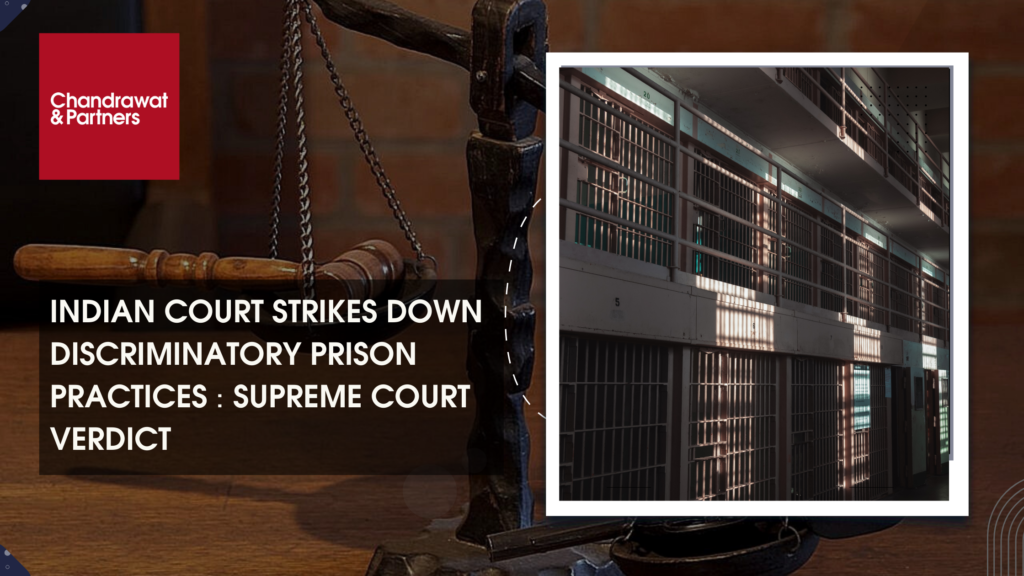Home > Recent Judgements > Indian Court Strikes Down Discriminatory Prison Practices : Supreme Court Verdict
Oct 03, 2024

INDIAN COURT STRIKES DOWN DISCRIMINATORY PRISON PRACTICES : SUPREME COURT VERDICT
In a landmark judgment Sukanya Shantha v. Union of India, delivered on October 3, the Supreme Court of India issued crucial guidelines aimed at preventing the caste-based segregation of prisoners and the division of labour within prisons based on caste. The Court struck down several provisions in state prison manuals that assigned jobs to prisoners based on their caste, marking it as a violation of Article 15 of the Indian Constitution, which prohibits discrimination based on caste, race, religion, or place of birth.
BACKGROUND
The case was initiated by Appellant (a journalist), who filed a Public Interest Litigation (PIL) after publishing an investigative report titled “From Segregation to Labour, Manu’s Caste Law Governs the Indian Prison System,” which exposed the discriminatory practices prevalent in Indian prisons. The report, published by The Wire in December 2020, highlighted that prison manuals in several states assign cleaning and sweeping tasks to marginalized castes while reserving more dignified jobs like cooking for prisoners from higher castes.
Appellant’s petition specifically focused on discriminatory practices in the prison systems of 13 states, including Rajasthan, Madhya Pradesh, Orissa, Uttar Pradesh, and Maharashtra etc. Appellant argued that caste-based segregation manifested in three primary ways:
- Division of manual labour,
- Segregation of prisoners into barracks based on caste,
- Provisions in state prison manuals that discriminated against de-notified tribes and labelled them as “habitual offenders.”
DISCRIMINATION AND VIOLATION OF CONSTITUTIONAL RIGHTS
The bench, comprising Chief Justice of India and Justices, held that assigning cleaning and sweeping tasks exclusively to marginalized castes while reserving cooking duties for higher castes is a direct violation of Article 15(1) of the Constitution which prohibits discrimination based on religion, race, caste, sex, or place of birth. The Court emphasized that such provisions not only discriminate but also reinforce harmful stereotypes, which serve to legitimize a social hierarchy rooted in caste.
The Court noted that this form of discrimination is a relic of the caste system’s association of certain occupations, such as cleaning and scavenging, with “impurity” and “pollution,” practices that are in direct violation of Articles 14 (equality before the law and equal protection of the laws in India.), 17 (It abolishes “untouchability” and forbids its practice in any form.), 21(It guarantees the right to life and personal liberty.), and 23(It prohibits forced labour and human trafficking.) of the Constitution. By perpetuating caste-based roles, the prison manuals violated these constitutional protections.
COURT’S KEY DIRECTIVES
In its judgment, the Supreme Court issued the following critical directives:
- Revision of State Prison Manuals: All states and union territories are required to amend their prison manuals to eliminate caste-based division of labour and segregation.
- Model Prison Rules: The Union Government must revise the Model Prison Rules to address caste-based segregation and ensure compliance by the states.
- Elimination of Caste References: The Court ordered the deletion of the “caste” column in all prisoner registers to prevent caste-based discrimination from continuing.
- Habitual Offenders: The Court also mandated that references to “habitual offenders” in prison manuals should be aligned with legislative definitions, removing discriminatory language.
The bench took strong exception to the provisions of the Uttar Pradesh Prison Manual, which allowed for prisoners to be assigned degrading work based on their caste background. It also flagged provisions in the prison manuals of West Bengal, Rajasthan, and Kerala, which explicitly linked certain tasks to marginalized communities, perpetuating caste-based roles.
CASTE SYSTEM AND UNTOUCHABILITY IN INDIAN PRISONS
The Court highlighted that assigning menial work based on caste is a reflection of untouchability and casteism, both of which are outlawed by the Constitution. CJI remarked, “No one is born in a class to do degrading work,” referring to the notion that certain communities are “accustomed” to performing menial tasks. CJI further noted that this idea stems from the rigid caste system, which has historically relegated certain groups to tasks considered impure or unclean.
The ruling categorically rejected the concept that any community is inherently suited to specific work, condemning it as a practice rooted in social exclusion and inequality. The Court also stated that caste-based segregation in prisons could reinforce caste animosity, making rehabilitation nearly impossible.
ACKNOWLEDGMENT OF APPELLANT’S EFFORTS
Before pronouncing the judgment, CJI lauded Appellant for well-researched article and the petition that followed. The Chief Justice emphasized the importance of citizen activism in bringing critical social issues to the Court’s attention. He also commended the legal team, including Senior Advocates, for effectively presenting the case.
OBSERVATION
The Supreme Court’s judgment is a critical step toward dismantling the remnants of caste-based discrimination in India’s prison system. It not only addresses the unconstitutional division of labour within prisons but also sends a powerful message that caste-based hierarchies, which have no place in a modern democratic society, must be eradicated. These ruling paves the way for a more just and equitable prison system, in line with the constitutional values of equality, dignity, and social justice.
For more information or queries, please email us at
enquiries@chandrawatpartners.com




